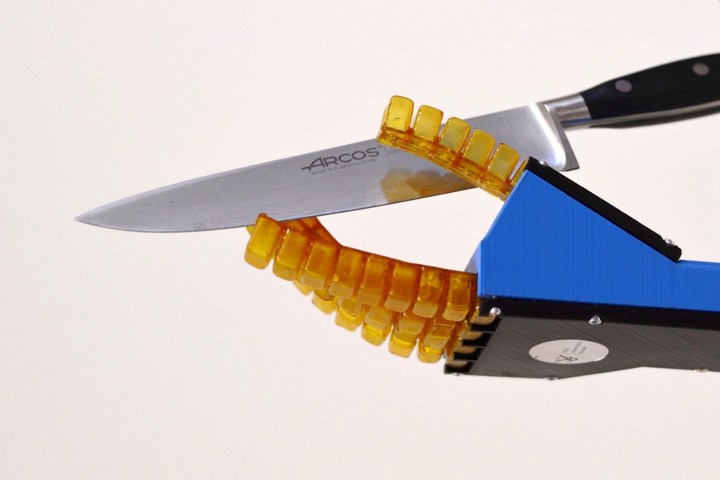
“Baymax, the inflatable robot in the Walt Disney movie Big Hero 6 was a soft robot,” professor Bram Vanderborght, from the university’s robotics and multibody mechanics research group, told Digital Trends. “In the movie, this robot got damaged and repairs itself in the police station with tape. Were he built out of [our] self-healing material, he would have been able to repair himself like animals and humans can do.”
The breakthrough material will not just make existing robots far easier to repair, but could also have a fundamental impact on how future robots are designed and built — since making them extra large and heavy duty to avoid suffering damage will not be so much of a necessity.

The material developed by the researchers is a jelly-like polymer. When it is heated up for 40 minutes at a temperature of 176 degrees Fahrenheit, a so-called “Diels-Alder” reaction takes place and the material repairs itself by melding together. After a 24-hour period at room temperature, the robot’s strength and flexibility are then restored. The material has so far been tested on a robot gripper that is used for picking up objects, an artificial muscle, and a robot hand. In all cases, the damage was healed completely after a full day, without any weak spots present.
An article describing the research was published in Science Robotics Journal.
“We think [there are] many possibilities,” Vanderborght said, concerning the researchers’ plans going forward. “This includes new fabrication technologies like printing, adding sensor network to detect health status and intelligence to control the device and new materials.”
While this is very much a proof-of-concept right now, we can only imagine the results that could be achieved were material like this to be combined with the robot, developed by researchers from Pierre and Marie Curie University and the University of Wyoming, that is able to work out how to continue moving even after being badly damaged.
Our only question now is whether there is going to come a point in history when we question the wisdom of building robots able to repair themselves. Somewhere in the future Terminator’s John Connor is probably yelling at us.
Editors' Recommendations
- Pepper robot’s future uncertain as SoftBank suspends production
- How robotic exoskeletons can help paraplegic patients heal from injuries
- Watch Spot and Pepper robots come together to cheer their baseball team
- Stanford’s shape-shifting ‘balloon animal’ robot could one day explore space
- This robot grabber is gentle enough to hold a jellyfish without damaging it


